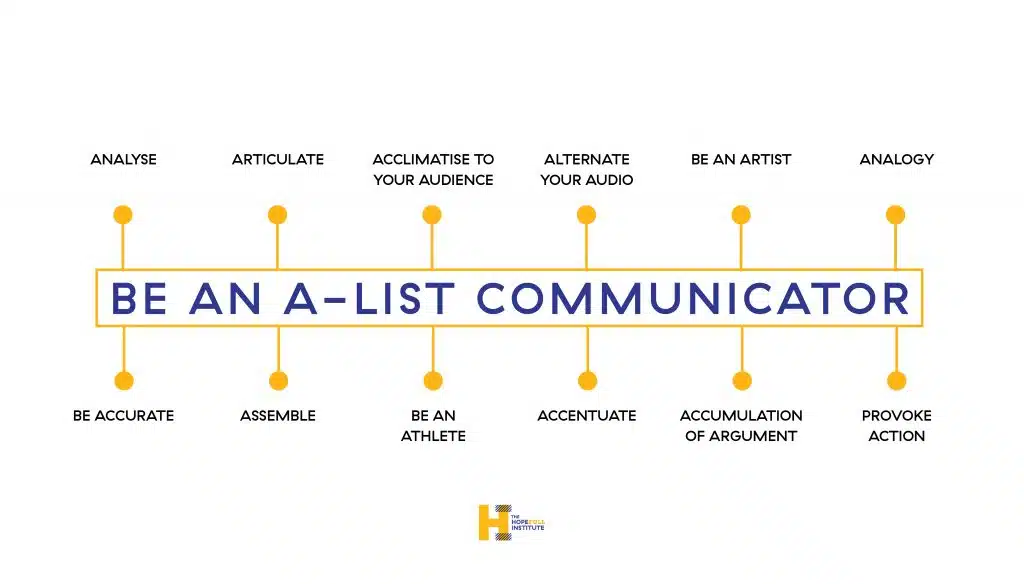I am a big believer in the art of oratory. In this modern era the best way to impact our world in a positive way is to stand up and say something. Words and the emotion in which those words are delivered can be broadcast across our planet at lightning speed. Rhetoric is language plus! It is different from giving a speech or being the master of ceremonies at a wedding.
Great oratory has the capacity to bring about a visceral shift in a person’s character and attitude. Winston Churchill once said, “Of all the talents bestowed upon men, none is so precious as the gift of oratory. He who enjoys it wields a power more durable than that of a great king.” This art form, presentation literacy can be taught and should be a fundamental skill we all have the pleasure of learning.
Below is a list of my top twelve tips for being an A-List Communicator and an inspiring motivational speaker.
1. ANALYSE
The first key to being an A-List Communicator is to commit to daily study so you can become an expert or thought leader in your field. Having something valuable to say is best done through having a wealth of knowledge. Analyse copious amounts of information and create your own message, modules and infographics to display your knowledge in a palatable way.
2. BE ACCURATE
Deliver well documented information and personally find the reference for all data and information presented. Saying, “Research has shown…”, but not being able to name the source means you are either making things up or don’t really know what your are talking about. Practise your presentation in a deliberate way to ensure you have mastered every element.
3. BE ARTICULATE
Daily increase your vocabulary by using a new word from the dictionary each time you deliver your talk. Words are the tools that we use to frame our thoughts. Make sure your tools are sharp and that you have the right tool for the task at hand.
4. BE AN ASSEMBLER
Create a digital storage file on every topic you are passionate about. Then collect stories, illustrations, statistics and quotes on each subject. Break your desk into two spaces a creative space and a digital space. In the digital space collate all your information you are studying into a system of files. Use the creative space (which holds your pens, pencils, blank paper and crayons) to create, ideate and design your thinking using mind maps and design thinking methods.
5. ACCLIMATISE TO YOUR AUDIENCE
Research your audiences’ socio-economic status, age, profile, religion and culture. Get a handle on their hopes and dreams. Exegesis the culture. Never lose touch with the audience. An amateurs best advice is to ‘imagine them naked’, but they deserve more respect than that. If you don’t respect your audience, they will not respect you.
6. BE AN ATHLETE
Study like you workout – daily. If you are tired it affects your articulation, you will start to breathe heavily and it will be noticed. Be disciplined and train yourself mentally, physically and spiritually. Develop the mindset of a champion when you speak. Demosthenes placed rocks in his mouth and ran up hills whilst declaring his speech in front of a roaring ocean. This exercise trained his voice for vocal strength to enabled him to speak to the masses.
7. ALTERNATE YOUR AUDIO
Monotone speakers are the worst to listen to, they send us off into Lala Land as they lull us off to sleep. Below are five essential ways to alternate your audio.
- a) Volume – speak louder than normal conversation. Project your voice to the back of the room. Vary your volume from loud to soft to moderate.
- b) Pitch – speak with melody and rhythm. Turn some of your sentences into a song or a rhyme.
- c) Rate – vary your speed from very fast, to fast, to medium, to slow, to very slow. Increase your range of gears.
- d) Pause – Learn the art of a long silent pause to bolster a point.
- e) Speak with empathetic enunciation, vary your tone.
8. ACCENTUATE
Stop giving a speech, rather communicate. Find your power zone and accentuate it. Your power zone could be humour, encouragement, motivation, content, emotion, intellectual thought or strategy, to name just a few. Discover your superpower and harness every bit of its power to move your audience.
9. BE AN ARTIST
Public Speaking is a performance art, so paint a picture when you speak. Build tension, raise questions and create contrast and conflict. Ambiguity can be your friend if it is used to create tension. When we hear a presentation we all know it will end happily but any good story poses challenges. We all know Katniss is going to make it, but we just want to see how much trouble she is going to get into along the way. A good plot keeps us interested, entertained and focused.
10. ACCUMULATION OF ARGUMENT
Present a coherent series of facts and statistics all pointing in a common direction. You want to state your case and then steadily build your argument. Then argue your case on the authority of your evidence and research. But make sure it has a rhythm attached to it and hits the audience in waves of emotion and enlightenment.
11. ANALOGY
If a picture tell a thousand words then an analogy brings forth a thousands truths. Analogies, stories and parables all contain hidden meanings and if delivered effectively can transform audiences. Analogies have been used throughout the centuries to bring about cultural change and they are just as powerful today.
12. PROVOKE ACTION
At the end of every speech have the audience respond and take decisive action. It has been said, when Cicero spoke the people stood and cheered, but when Demosthenes spoke the people stood and marched. Get them to march and you will be well on your way to being an A-List Communicator.
INFOGRAPHIC
WANT MORE
Presentation Literacy – The Art of Effective Communication, delivered by Glen Gerreyn is the new seminar being offered by The HopeFull Institute. Contact us for more details.


